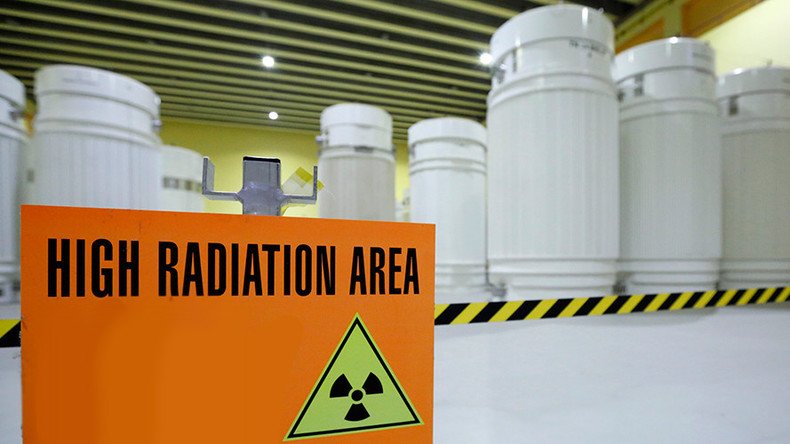Risk of nuclear theft, sabotage, cyberattacks by terrorists may be increasing – report

A nuclear watchdog group warns that, despite efforts to secure nuclear material, nations are still vulnerable to theft, as well as acts of sabotage or cyberattacks, which could enable terrorists to obtain nuclear materials or trigger a dangerous meltdown.
Twenty-four states “still have one kilogram (2.2 pounds) or more of weapons-usable nuclear materials…[and] nearly 2,000 metric tons (4.4 million pounds) of weapons-usable nuclear material remain stored around the world, much of it still too vulnerable to theft,” said Sam Nunn, chair of the Nuclear Threat Initiative, in the introduction to a new report titled “2016 NTI Nuclear Security Index: Theft and Sabotage.”
The NTI Index ranks nations in terms of their safeguards for keeping nuclear explosive materials protected.
An independent watchdog says U.S. efforts to keep nuclear materials away from terrorists are losing steam. https://t.co/GhhcIQMC3R
— Public Integrity (@Publici) January 15, 2016Alarmingly, the report found that more than 80 percent of all nuclear explosive materials are held by militaries “whose practices and safeguards are not covered by international agreements on security of such materials.” The report urged all nuclear weapons states to agree on a set of security precautions to implement.
“We are in a race between cooperation and catastrophe, and the world’s leaders must run faster,” said Nunn, a former Senate Armed Services Committee Chair, in commenting on the reports’ findings, according to The Center for Public Integrity.
In 2014, the index listed seven countries that were taking the most important steps in preventing theft of nuclear materials through their elimination, but two years on only one country, Uzbekistan, had done so.
Nunn told The Center for Public Integrity that “brutal attacks and incidents by ISIL, Al Qaeda, Boko Haram and other organizations are on the rise, raising the specter of catastrophic nuclear terrorism if they or other terrorists get control of dangerous nuclear materials.”
He added, “…Of course, that’s what the world must prevent.”
Among the 24 states with weapons-usable nuclear materials, Australia topped the list of countries with strong nuclear protections for the third time, and Japan was the most improved state. North Korea came in last. France, the US, and the United Kingdom score the highest among nuclear-armed states, and the US, India, Russia and the UK are the most improved nuclear-armed states, according to the report.
Experts warn that nuclear risks may be increasing: U.S. efforts to keep nuclear explosive materials out of the… https://t.co/1fygv5O9j6
— Philly Buzz (@philly_buzz) January 15, 2016Sweden earned first place for states without or with less than one kilogram of weapons-usable nuclear materials, and Djibouti is the most improved of those states, noted the report.
Other findings were that no improvements have been made in several areas to secure highly enriched uranium and plutonium since 2014. Those areas are on-site physical protection, control and accounting, insider threat prevention, physical security during transport, and response capabilities.
US Nuclear Arsenal Is Killing Americans! [VIDEO] https://t.co/waLoF6JwIQ@LeeCamppic.twitter.com/8EMSVCJN5A
— RT America (@RT_America) December 20, 2015For the first time, the index included the risk to nuclear facilities posed by cyberattacks and sabotage, and found that nearly half of the assessed countries did not have a single requirement to protect facilities from cyberattacks. Only nine of the 24 countries with weapons-usable material received a maximum score on cybersecurity.
The report also found that 45 countries with nuclear facilities were struggling to put basic measures in place to prevent an act of sabotage that could result in a radiological release on par in scale with that of the 2011 Fukushima disaster in Japan.
US successfully tests nuclear gravity bomb in Nevada following $8bn upgrade https://t.co/nGBbJu3bfOpic.twitter.com/jNA4linfaN
— RT America (@RT_America) November 17, 2015The report found that Finland topped the list of those in need of protection. Australia, Canada, the UK, and Japan rounded out the top five.
World leaders are scheduled to meet in Washington, DC on March 31 for the final Nuclear Security Summit, which was created to draw attention to the potential for theft of nuclear material.












